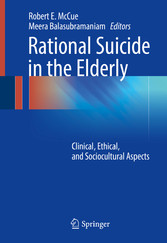
Rational Suicide in the Elderly - Clinical, Ethical, and Sociocultural Aspects
von: Robert. E McCue, Meera Balasubramaniam
Springer-Verlag, 2016
ISBN: 9783319326726
Sprache: Englisch
229 Seiten, Download: 5717 KB
Format: PDF, auch als Online-Lesen
| Contents | 5 | ||
| Contributors | 7 | ||
| Introduction | 9 | ||
| 1: Can Suicide in the Elderly Be Rational? | 12 | ||
| 1.1 Introduction | 12 | ||
| 1.2 Suicide, Mental Illness, and Rationality | 14 | ||
| 1.3 The Meanings of Suicide | 20 | ||
| 1.4 The Paradigm of Terminal Illness Making Suicide Rational | 22 | ||
| 1.5 Assessing Rationality in the Elderly | 24 | ||
| 1.6 Cases and Commentary | 27 | ||
| References | 31 | ||
| 2: Would This Be Rational Suicide? | 33 | ||
| 2.1 Introduction to Mr. D | 33 | ||
| 2.2 Criterion 1: The Ability to Demonstrate Rationality | 35 | ||
| 2.3 Criterion 2: Realistic Information and Judgment About the Lifeworld | 36 | ||
| 2.4 Criterion 3: Lucid State of Mind, Intelligible Emotion, and Authentic Will | 37 | ||
| 2.5 Criterion 4: Congruence with Fundamental Values and Critical Interests | 38 | ||
| 2.6 Conclusion | 39 | ||
| References | 41 | ||
| 3: Rational Suicide and the Law | 43 | ||
| 3.1 Introduction | 43 | ||
| 3.2 Legal Background | 43 | ||
| 3.3 Assisting a Suicide | 44 | ||
| 3.4 Legalized Physician-Assisted Suicide | 46 | ||
| 3.5 Civil Liability and Treating the Suicidal | 48 | ||
| References | 53 | ||
| 4: Refractory Depression and the Right to Terminate Active Treatment | 55 | ||
| 4.1 Introduction | 55 | ||
| 4.2 Treatment-Resistant Depression (TRD) | 56 | ||
| 4.3 Terminal Depression and the Case of Mr. A | 57 | ||
| 4.4 Biological Substrates of TRD | 60 | ||
| 4.5 Novel Antidepressant Approaches to TRD | 61 | ||
| 4.6 Decision-Making Capacity | 63 | ||
| 4.7 End-of-Life Decisions in Psychiatric Patients in Europe | 65 | ||
| 4.8 Discussion | 66 | ||
| References | 67 | ||
| 5: A Psychological History of Ageism and Its Implications for Elder Suicide | 72 | ||
| 5.1 Traditional History of Ageism: The Lens of Social Gerontology | 74 | ||
| 5.2 Psychological History of Ageism | 75 | ||
| 5.2.1 Ageism as Rooted in the Fear of Death | 75 | ||
| 5.2.2 Ageism as Rooted in Perception | 76 | ||
| 5.2.3 Ageism as Rooted in How We Think | 77 | ||
| 5.3 Implications for Elder Suicide | 78 | ||
| 5.3.1 A Brief History of Attitudes Toward Suicide | 79 | ||
| 5.3.2 Elder Suicide in Our Contemporary World | 79 | ||
| 5.4 Conclusion | 81 | ||
| 5.5 Notes | 81 | ||
| References | 82 | ||
| 6: Rational Suicide in the Elderly: Anthropological Perspectives | 84 | ||
| 6.1 Introduction | 84 | ||
| 6.2 Suicide and Culture | 85 | ||
| 6.3 Historical Perspectives | 86 | ||
| 6.4 Anthropology and Rational Suicide | 87 | ||
| 6.5 Conclusion | 90 | ||
| References | 91 | ||
| 7: Life’s Meaning and Late Life Rational Suicide | 92 | ||
| 7.1 Introduction | 92 | ||
| 7.2 Two Questions About the Meaning of Life | 94 | ||
| 7.3 Can a Human Life Have Meaning? | 95 | ||
| 7.4 What Makes a Human Life Meaningful? | 100 | ||
| 7.5 Life’s Meaning and Suicide | 103 | ||
| 7.6 Conclusion | 105 | ||
| References | 106 | ||
| 8: Baby Boomers and Rational Suicide | 108 | ||
| 8.1 Introduction | 108 | ||
| 8.2 What Is so Special About the Baby Boomers? | 109 | ||
| 8.3 Attitudes Toward Youth and Aging | 110 | ||
| 8.4 Baby Boomers and Death | 112 | ||
| 8.5 Baby Boomers and Suicide Risk in Late Life | 113 | ||
| 8.5.1 Social Isolation | 113 | ||
| 8.5.2 Substance Use | 113 | ||
| 8.5.3 Chronic Illnesses | 114 | ||
| 8.5.4 Financial Difficulties | 115 | ||
| 8.6 Conclusions | 116 | ||
| References | 117 | ||
| 9: Who Are the Elderly Who Want to End Their Lives? | 121 | ||
| 9.1 Definition of Rational Suicide | 122 | ||
| 9.2 Epidemiology | 123 | ||
| 9.3 Age and Ageing | 123 | ||
| 9.4 Gender | 125 | ||
| 9.5 Marital Status | 125 | ||
| 9.6 Ethnicity | 126 | ||
| 9.7 Religion | 126 | ||
| 9.8 Spirituality | 127 | ||
| 9.9 Education | 128 | ||
| 9.10 Social Support | 128 | ||
| 9.11 Physical Problems and Ill Health | 128 | ||
| 9.11.1 Cancer/Malignancy | 128 | ||
| 9.11.2 Pain | 129 | ||
| 9.11.3 Alzheimer’s Disease/Cognitive Impairment | 129 | ||
| 9.11.4 Sensory Impairment | 130 | ||
| 9.12 Depression and Euthanasia/PAS | 130 | ||
| 9.12.1 Depression/Depressive Symptoms in the Context of Medical Problems | 130 | ||
| 9.12.2 Depression in the Context of Terminal Illness | 130 | ||
| 9.12.3 Depression and Stability of Attitudes Towards Euthanasia/PAS | 131 | ||
| 9.13 Personality Factors | 131 | ||
| 9.14 Psychological Factors: Life Satisfaction and Burden on Others | 132 | ||
| 9.15 Conclusions | 133 | ||
| References | 134 | ||
| 10: Psychological Issues in Late-Life Suicide | 137 | ||
| 10.1 Introduction | 137 | ||
| 10.2 Psychological Theories of Suicide | 138 | ||
| 10.3 Rational Suicide Risk Assessment | 139 | ||
| 10.3.1 Traditional Suicide Risk Assessment | 139 | ||
| 10.3.2 Motivational Interviewing | 140 | ||
| 10.3.3 Self-Determination Theory | 141 | ||
| 10.3.4 Collaborative Assessment and Management of Suicidality (CAMS) | 142 | ||
| 10.3.5 Structured Assessments | 142 | ||
| 10.3.6 Medical Decision-Making Capacity | 143 | ||
| 10.4 Lessons from Psycho-Oncology | 143 | ||
| 10.4.1 Desire for Hastened Death | 144 | ||
| 10.4.2 Hopelessness | 145 | ||
| 10.4.3 Burdensomeness, Helplessness, and Loss of Control | 146 | ||
| 10.4.4 Social Support | 147 | ||
| 10.4.5 Existential Distress | 147 | ||
| 10.5 Practice Guidelines | 148 | ||
| 10.5.1 Interdisciplinary Intervention | 150 | ||
| 10.6 Conclusion | 150 | ||
| References | 150 | ||
| 11: A Psychodynamic Perspective on Suicidal Desire in the Elderly | 156 | ||
| 11.1 The Case of Ms. A | 156 | ||
| 11.2 Theories of Suicide: Freud and Beyond | 157 | ||
| 11.3 Revisiting the Case of Ms. A | 160 | ||
| 11.4 Conclusion | 164 | ||
| References | 164 | ||
| 12: Impact of Psychotherapy on Rational Suicide | 166 | ||
| 12.1 Introduction | 166 | ||
| 12.2 Motivational Interviewing | 168 | ||
| 12.2.1 Empirical Research | 170 | ||
| 12.2.2 Application to Rational Suicide | 170 | ||
| 12.3 Safety Planning | 171 | ||
| 12.3.1 Empirical Research | 172 | ||
| 12.3.2 Application to Rational Suicide | 172 | ||
| 12.4 Cognitive-Behavioral Therapy | 173 | ||
| 12.4.1 Empirical Research | 173 | ||
| 12.4.2 Application to Rational Suicide | 174 | ||
| 12.5 Dialectical Behavior Therapy | 175 | ||
| 12.5.1 Empirical Research | 176 | ||
| 12.5.2 Application to Rational Suicide | 176 | ||
| 12.6 Mindfulness and Acceptance | 176 | ||
| 12.6.1 Empirical Research | 178 | ||
| 12.6.2 Application to Rational Suicide | 178 | ||
| 12.7 Existential Therapies | 179 | ||
| 12.7.1 Empirical Research | 179 | ||
| 12.7.2 Application to Rational Suicide | 180 | ||
| 12.8 Psychodynamic Therapy | 181 | ||
| 12.8.1 Empirical Research | 181 | ||
| 12.8.2 Application to Rational Suicide | 182 | ||
| 12.9 Interdisciplinary Collaboration | 182 | ||
| 12.10 Practice Guidelines | 183 | ||
| 12.10.1 Prevent Impulsive Behavior | 183 | ||
| 12.10.2 Nonjudgmentally Explore Suicidality and Values | 183 | ||
| 12.10.3 Cognitive-Behavioral and Mindfulness Skills Can Be Helpful | 184 | ||
| 12.10.4 Existential Concerns are Important | 184 | ||
| 12.10.5 Collaboration with Patients’ Systems Is Critical | 185 | ||
| 12.10.6 Some Things Are Not Recommended | 185 | ||
| 12.10.7 Be Mindful of Own Values | 185 | ||
| 12.11 Conclusions | 186 | ||
| References | 186 | ||
| 13: Spirituality, Religion, and Rational Suicide | 193 | ||
| 13.1 Introduction | 193 | ||
| 13.2 Engaging Religion and Spirituality: The FICA Spiritual History Tool | 194 | ||
| 13.3 Religion, Spirituality, and Rational Suicide, with Focus on Christianity | 195 | ||
| 13.4 Historical Christian Perspectives on Suicide | 196 | ||
| 13.5 Contemporary Christian Perspectives on Suicide | 197 | ||
| 13.6 Two Affirmations Behind Modern Christian Objections to Rational Suicide | 198 | ||
| 13.6.1 Affirmation 1: “Autonomy” and “Rationality” Are Modern Constructions | 198 | ||
| 13.6.2 Affirmation 2: Vulnerability Is Normative, and Christians Belong to God and to Each Other | 199 | ||
| 13.7 Two Christian Objections to Rational Suicide | 201 | ||
| 13.7.1 Objection 1. Suicide Addresses Suffering by Eliminating the Sufferer | 201 | ||
| 13.7.2 Objection 2. Suicide Diminishes the Role of Community in Bearing the Burdens, and Vulnerability, of Those Who Suffer | 203 | ||
| 13.8 Conclusions: Practical Recommendations for Clinicians | 206 | ||
| References | 207 | ||
| 14: Classic Psychedelics and Rational Suicide in the Elderly: Exploring the Potential Utility of a Reemerging Treatment Paradigm | 209 | ||
| 14.1 Introduction | 209 | ||
| 14.2 Sociopolitical History of Classic Psychedelics | 209 | ||
| 14.3 Empirical Findings with Classic Psychedelics: Implications for Rational Suicide | 211 | ||
| 14.4 Conclusion | 214 | ||
| References | 214 | ||
| 15: Epilogue | 217 | ||
| Index | 224 |








